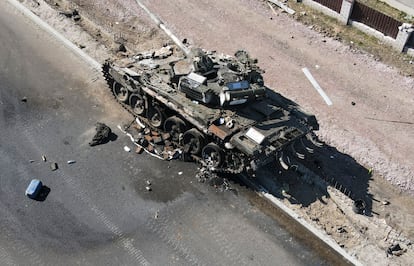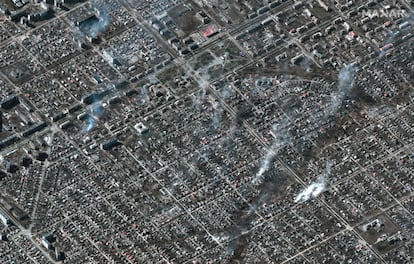Deaths of Russian generals reveal weak points of Kremlin’s strategy in Ukraine
The number of troops who have died in the war is much higher than what is being reported by Russia, with some estimates putting the figure in the thousands

If removing the leadership of an enemy force is one of the basic goals in war, then the Russian offensive in Ukraine may be in trouble. The Ukrainian government says that it has killed at least five Russian generals and a handful of commanders, while some estimate that thousands of Russian troops have died in the conflict. It’s a heavy toll for a campaign the Kremlin described as “surgical,” even though nearly a month has passed since it launched its first attack. Russian President Vladimir Putin, however, has claimed that “everything is going to plan.”
The most recent Russian officer to be killed in combat was Andrei Nikolayevich Palii, the deputy commander of the Black Sea Fleet. According to the Ukrainian government, the officer was killed by a sniper. In a message on Telegram, Mikhail Razvojaev, the governor of Sevastopol in Crimea, described Palii as an “open and honest man” and a “true officer of a military dynasty” who had “great authority over the fleet.”
Palii was born in Kyiv, the capital of Ukraine, in 1971, but after the breakup of the USSR he decided to serve in the Russian military, even acting as deputy commander in Russia’s armed forces in Syria in 2020. According to the Russian news outlet Forpost, Palii had been tasked with ensuring the humanitarian corridor in Mariupol, which has become one of the main fronts of the war.
The first death of a high-ranking officer to be recognized by the Kremlin was Russian Major General Andrey Sukhovetsky, who was appointed deputy army commander of the 41st division. Born in 1974, Sukhovetsky had received two Orders of Courage and the Order of Military Merit. His death, which was announced by Ukraine on March 1, was confirmed by a local officers’ organization in the Krasnodar region in southern Russia. Even Putin confirmed in a speech that he had died.
The death of the other three high-ranking officers, however, has neither been confirmed nor denied by the Kremlin. Major General Vitaly Gerasimov, chief of staff of Russia’s 41st combined army, died on March 7, according to the Ukrainian government. The investigative journalism site Bellingcat – which is declared a foreign agent by Russia – published a recording in which two members of Russia’s Federal Security Service (FSB) allegedly lament that the officer had been killed because their lines of communication in Ukraine were no longer secure. But when asked about Gerasimov by Reuters, Russia’s Defense Ministry declined to comment.
The Kremlin has also not officially confirmed the death of Major General Andrei Kolesnikov, of the 29th combined army, who was killed in Kyiv on March 11, according to Ukrainian Interior Ministry adviser Anton Gerashchenko.

Four days later, Gerashchenko also announced on Telegram that Ukraine’s Azov battalion had killed another Russian general major. An image of the victim was included in the message, but there was no mention of the officer’s name, nor division, and his face was covered with different documents with alleged military insignia.
Nearly a dozen Russian colonels have also been killed in the fighting, including Sergei Sukharev, of the 331st Guards Parachute Assault Regiment, who died with four other officers on March 17, according to regional Russian TV. As Russia’s efforts to advance forward are frustrated, officers may be facing greater personal risk. According to the Russian news agency Bashinform, one commander was killed in a mortar attack while personally helping to build a crossing.
In addition to the deaths in combat, eight high-ranking military officers have also been removed from their posts, according to sources from the Ukrainian government. While media outlets are trying to verify this information, the dismissal of General Roman Gavrilov, the deputy director of Rosgvardia, the National Guard of Russia, has been confirmed. Russian authorities claim the general was dismissed because his length of service had come to an end. But Russian newspaper Kommersant reported that he could have led the National Guard for another 20 years. As well as the death of the generals, this sudden change to the military hierarchy is another sign that the war against Ukraine is not going according to plan, despite Putin’s claims.
What’s more, estimates suggest that the real death toll of Russian troops is much higher than what is being reported by the Kremlin. The Russian Defense Ministry said on March 2 that 498 soldiers had died, but since then has made no further comment. The New York Times, however, estimated on February 16 that between 3,000 and 7,000 Russian troops may have been killed. While Russian newspaper Komsomólskaya Pravda reported online that 9,861 soldiers had died in combat and another 16,153 had been injured. These figures were quickly removed from the site, but The Wall Street Journal took a screenshot of the report before it disappeared.
Tu suscripción se está usando en otro dispositivo
¿Quieres añadir otro usuario a tu suscripción?
Si continúas leyendo en este dispositivo, no se podrá leer en el otro.
FlechaTu suscripción se está usando en otro dispositivo y solo puedes acceder a EL PAÍS desde un dispositivo a la vez.
Si quieres compartir tu cuenta, cambia tu suscripción a la modalidad Premium, así podrás añadir otro usuario. Cada uno accederá con su propia cuenta de email, lo que os permitirá personalizar vuestra experiencia en EL PAÍS.
¿Tienes una suscripción de empresa? Accede aquí para contratar más cuentas.
En el caso de no saber quién está usando tu cuenta, te recomendamos cambiar tu contraseña aquí.
Si decides continuar compartiendo tu cuenta, este mensaje se mostrará en tu dispositivo y en el de la otra persona que está usando tu cuenta de forma indefinida, afectando a tu experiencia de lectura. Puedes consultar aquí los términos y condiciones de la suscripción digital.








































